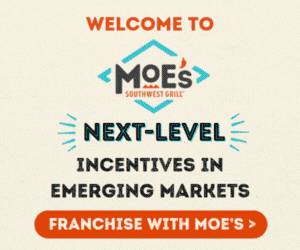Does "the Cloud" Portend the End of IT?
Ten years ago, if someone told you that the second biggest retail company by market capitalization (after Walmart) would actually be a virtual or a cloud company, you would have laughed. The fact that AT&T and Verizon would be selling off their landline operations would have been considered impossible. If someone said you could run an entire office without any physical infrastructure except your laptop and smartphone (no servers, PBX boxes, etc.), the person making such a statement would have been declared crazy.
But the "cloud" has affected us in a dramatic way, and all of the above have become truths. Today, you don't need a landline-based phone system for your office. It's actually considered archaic and hinders productivity compared with the features that cloud-based systems provide.
Today, franchisor or franchise offices don't need any desktop software because all of the productivity applications, including word processing, spreadsheets, accounting, CRM, etc., are all available as cloud-based applications. All of your key contracts, documents, and franchise agreements can simply be stored in the cloud in franchise management systems, instead of maintaining a thick folder for every franchisee and an invoice and receipts folder for accounting or tax purposes.
Your franchise field staff can easily access all of the franchisee data over the web, submit Q&A forms over cloud-based franchise management systems, look up revenue numbers, etc. all over the web. The smarter franchise systems have started running the POS for their franchisees in the cloud. It makes upgrades possible in one night, provides real-time revenue numbers, and creates uniformity across your entire franchise.
In fact, there is a cloud-based application for any or every need. The big question is: Are you comfortable trusting the cloud? What if the cloud goes down or there is loss of data? And what about the costs? Let's look at some of these issues.
24/7 Availability: Cloud-based systems have become remarkably stable and available over the years. Most providers today guarantee 99.5% or higher availability. Having said that, there is always a chance that either your Internet connection or the cloud may go down once in a while. The solution for Internet connections is fairly easy: always have two different providers serve you (say a cable Internet and a FIOS provider) and combine their bandwidth using a smart router. To handle cloud providers going down, segment your applications from mission-critical (phone systems, POS) to critical (accounting, franchise management systems) to necessary (office and storage applications), and then consider backup strategies for the three segments and their cost. There are always greater uptime options available (99.9% or 99.99%), but at a significant cost.
Data Backup: One of the biggest fears in using cloud-based systems is the loss of data. The first step here is to look at the size of the provider and its backup strategies. Larger providers are likely to have a more robust infrastructure, but unless these providers guarantee secure data backup, you may not benefit from the size. The second step is to look at local backup strategies where you export the data from the cloud provider to your own local hard drive on a daily or weekly basis.
Security: The hard reality is that the web will never be secure. But in a connected world, your desktop is probably less secure than the web. It is much easier for a hacker to access valuable files stored on your desktop or laptop than it is to access most cloud-based systems, which deploy multiple firewalls and intrusion prevention systems. The recommendation here is to ensure that your provider stores all sensitive data (Social Security numbers, personal information, etc.) in an encrypted format. In addition, all of your communication should happen over SSL (or HTTPS when you access a cloud provider's website).
Costs: Cloud-based services cost much less than having dedicated hardware and a large support team of IT staff members. Most cloud services cost less than $5 to $50 per user per month, and if you added all of them, you are likely to come up with a number that is less than $200 per month per employee. If you look at the cost of supporting hardware, creating a help desk to support desktop applications, paying maintenance fees to software vendors, and training your IT team to support these applications, you are likely to have savings of 25 to 50 percent by using cloud-based systems.
My prediction is that in less than five years from now, we will have two devices: a smartphone and some kind of tablet/PC hybrid (currently they are called ultrabooks); half the office staff will be working remotely (since good talent is not associated with just one location); and all of the smart franchise systems will be 90 percent cloud-based. In other words, this would spell the end of local IT as we know it.
Amit Pamecha is the CEO and co-founder of FranConnect, a provider of franchise management systems. He can be reached at 703-390-9302 or [email protected].
Share this Feature
Recommended Reading:
| ADVERTISE | SPONSORED CONTENT |
FRANCHISE TOPICS
- Multi-Unit Franchising
- Get Started in Franchising
- Franchise Growth
- Franchise Operations
- Open New Units
- Franchise Leadership
- Franchise Marketing
- Technology
- Franchise Law
- Franchise Awards
- Franchise Rankings
- Franchise Trends
- Franchise Development
- Featured Franchise Stories








 The franchise listed above are not related to or endorsed by Franchise Update or Franchise Update Media Group. We are not engaged in, supporting, or endorsing any specific franchise, business opportunity, company or individual. No statement in this site is to be construed as a recommendation. We encourage prospective franchise buyers to perform extensive due diligence when considering a franchise opportunity.
The franchise listed above are not related to or endorsed by Franchise Update or Franchise Update Media Group. We are not engaged in, supporting, or endorsing any specific franchise, business opportunity, company or individual. No statement in this site is to be construed as a recommendation. We encourage prospective franchise buyers to perform extensive due diligence when considering a franchise opportunity.